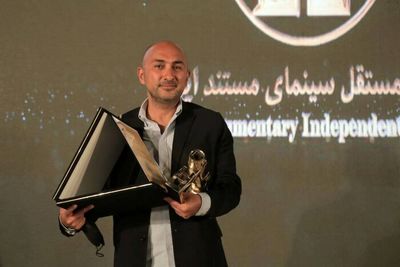Due to the pandemic, only winners along with a limited number of crew members were invited to the gala held at the Iranian House of Cinema on Friday evening.
Co-produced by Mohammad Shakibania and Mohsen Shahmohammad-Mirab, the documentary is about the Iranian national women’s inline hockey team that is preparing to compete in South Korea. Throughout the film, these women struggle with their greatest fears and become stronger as they begin to believe in themselves and rely on the skills and strength they thought they did not have, but were wrong. They had it in themselves all along and simply had to dig it out.
The film also brought Reza Teimuri, the award for best cinematographer.
Shaahin Purdadashi won the award for best location sound recordist for this film and the documentary “Woodgirls - A Duet for a Dream”.
Ensieh Maleki was also selected as best sound engineer for her collaboration in “No Place for Angels” and “The Unseen”.
Hayedeh Safiyari and Farahnaz Sharifi also shared the award for best editor for “No Place for Angels” and “Radiograph of a Family” respectively.
Behzad Nalbandi was named best director for “The Unseen”.
When foreign dignitaries are expected in Tehran, the local authorities dedicate themselves to an “urban beautification” process which includes the rounding up of unsavory characters - drug addicts and prostitutes - from the streets. The men are released after a few days, but the women are kept as wards of the state in perpetuity. They are sent to holding centers on the outskirts of the city where no records are kept by the social workers.
This animated documentary attempts to give a voice to homeless women taken off the streets against their will, stripped of their rights and kept incarcerated until their death.
Director Firuzeh Khosrovani was honored with the special jury award for “Radiograph of a Family”, which is a co-production of Iran, Switzerland and Norway.
Khosrovani investigates her parents’ unusual marriage in this documentary steeped in bittersweet history. Hossein, a radiologist, is secular and sophisticated, while his young bride Tayi is a devout Muslim, shocked by her new husband’s Western tastes.
Khosrovani creates a poetic portrait of a fraught but loving relationship set against 1960s Switzerland and revolutionary-era Iran using family photos, other archival materials, recreated and imagined dialogue, and the geographical dimensions of her childhood home.
Sattar Uraki won the award for best composer for his collaboration in “Isatis” directed by Ahmad Dehqan.
The award for best research went to “Return” directed and written by Farhad Varahram. This film also brought him the award for best writer. In addition, Shahram Derakhshan was picked as best narrator for this film.
In the mid-length documentary category, “Rashow” by Reza Abbasi was named best film. Mojgan Sayyadi is the producer of the film.
No winner was announced for best director in this section, while Mehdi Zamanpur Kiasari for “Kal Fatemeh” and Baktash Abtin for “A Termite with Milk Teeth” received honorable mentions.
“Aqueduct” by Hadi Afarideh was selected best short documentary and Mohsen Zarifipur was named best director in the short documentary competition for his “Lullabies of Abu Hamizeh”.
Documentarians Hamidreza Ahmadi Lari and Sam Kalantari were also honored with lifetime achievement awards at the celebration.
Source: Iran Daily

